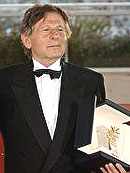Roman Polanski 's 'The Pianist' Wins Palme
D'Or at Cannes Film Festival
 |
| French
director Roman Polanski poses with his Palme d'Or for
the film "The Pianist" after the award ceremony of the
55th Film Festival in Cannes, on the French Riviera,
Sunday, May 26, 2002. |
"The Pianist," Roman Polanski's
highly personal film about a musician who survives the Holocaust,
won the Palme d'Or at the Cannes Film Festival on
Sunday.
The film stars Adrien Brody as a brilliant
Polish pianist who manages to escape the Warsaw ghetto
and is finally saved by a German officer. As boy in Poland,
Polanski himself survived the Krakow ghetto but lost his
mother at Auschwitz.
In a year of especially high-quality films, second place,
or the grand prize, went to "The Man Without a Past"
by Finnish director Aki Kaurismaki, a whimsical tale of
an amnesia victim who rediscovers life and love in
the slums of Helsinki.
Polanski, 68, was born in France but moved
to Poland with his parents two years before the outbreak
of World War II. He says he always knew he would return
to Poland to make a Holocaust film, but was waiting for
the right story. He found it in the memoirs of pianist Wladyslaw
Szpilman.
Although the film was not his own story, Polanski
says he used a host of personal memories to fill in the
blanks, for everything from the size of ghetto crowds to
the way Nazi troops walked and what they wore.
"I'm honored and moved to accept this
prize for a film that represents Poland," Polanski
said, as his star, Brody, wiped away tears in the audience.
Best director went to American director Paul
Thomas Anderson for his darkly comic "Punch-Drunk Love,"
starring Adam Sandler and Emily Watson, and also to Im Kwon-taek,
the South Korean director of "Chihwaseon," a beautifully
filmed look at the life of a 19th-century Korean painter.
Best actor went to Belgium's Olivier Gourmet
of "The Son" by Jean-Pierre and Luc Dardenne.
Gourmet played a man who refuses to take a boy into his
carpentry workshop, then becomes obsessed with him and follows
him through the streets.
Best actress went to Finland's Kati Outinen,
who played the Salvation Army worker who falls in love with
the amnesia victim in Kaurismaki's "The Man Without
a Past."
The jury prize, another special honor, went
to "Divine Intervention" by Palestinian director
Elia Suleiman, a film that took the risk of using humor
to depict the tragedy of the Israeli-Palestinian conflict.
